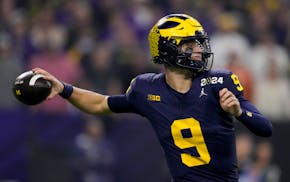Forbes Magazine annually compiles sports franchise value data, and the numbers released this week on the NBA speak to one thing in particular: the power of TV money.
It was assumed the NBA — which announced a massive new TV deal in October, jumping from less than $1 billion per year to more than $2.6 billion per year — would see large gains in franchise values.
But the raw data — the average value of franchises jumped a whopping 72 percent from last year to this year — is eye-opening even when accounting for expectations.
A year ago, there were just three teams valued at $1 billion or more; now there are 11 such teams, including three (the Lakers, Knicks and Bulls) valued at $2 billion or more.
The Timberwolves' jump wasn't quite that dramatic, but it is still sharp: a 45 percent increase, from $430 million in 2014 to $625 million in 2015. While that value puts Minnesota 29th among the 30 NBA franchises (only the Bucks are valued lower), it is the continuation of an upward trend for the Wolves.
For most of the mid-to-late-2000s, the Wolves hovered around a $300 million value mark. The recession and NBA work stoppage dropped the Wolves to down to $264 million in 2011 (their lowest value since 2004) and it increased only modestly to $272 million in 2012.
In the past three years, though, the Wolves have seen a 130 percent increase in their value.
Very little, if any, of that increase can be attributed to improved play since Minnesota hasn't made the playoffs since 2004. Average attendance at Wolves home games has declined from more than 17,000 in 2011-12 to less than 14,000 this season.
It doesn't matter. The power of TV money conquers all.
The same thing happened in baseball between 2012 and 2013 after MLB announced a huge new television deal.
Forbes valuations between those years jumped an average of 23 percent per team. The Twins went from $510 million to $578 million in value from 2012 to 2013 despite their average attendance going down by more than 3,000 fans per game.
The Vikings? They were worth $437 million in 2002. Now they're valued at $1.15 billion. Some of that has to do with their new stadium, but a lot of it has to do with NFL TV money.
Wins and losses are nice. But in the biggest U.S. sports leagues, TV is what shows owners the money.
Michael Rand
